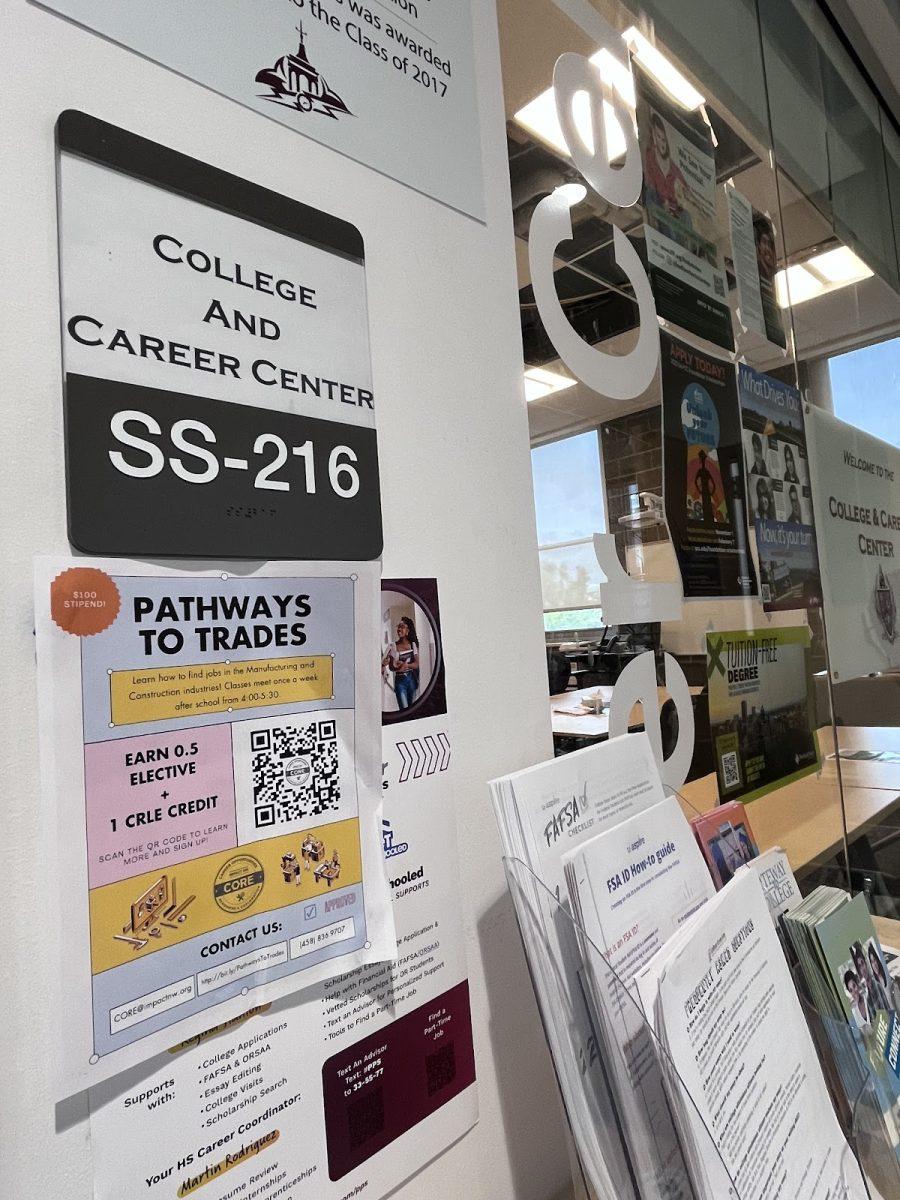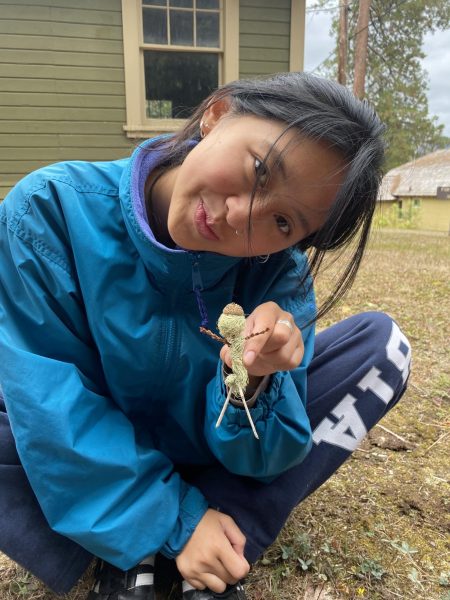The 2023-24 school year is coming to an end, and young adults across the country are on the brink of breaking into the real world. While many graduates choose to continue their education further past high school, there are many pathways to follow that don’t involve attending a college or university.
One alternative path graduates may pursue is in the trades, such as in the fields of plumbing, carpentry, landscaping, and more. Pursuing a trade puts students on a direct path to a career, typically costing significantly less to get certifications, with an overall quicker and higher return on investment. This can mean that, when a student is done with trade school, the amount they paid to receive that education can be paid back at a faster rate than if they attended a college or university.
In a study conducted by the Woodworking Network, results showed that someone who attended a trade school could expect to end up making 22 times more than what they spent on their education, while in comparison a traditional college graduate is expected to only end up making 15 times the amount they spent on schooling.
There are many overlooked professions in trades that are invaluable contributors to society. Industrial manufacturers design and build the aircrafts that transport goods and people around the world. Construction workers and carpenters create the buildings we live and work in, making the industry an integral piece of society. Everything you see around you was made by someone, and most of the time that person learned their skills through a trades program.
Daniel Silvernail teaches courses in woodshop, construction, and industrial technology at Franklin. Silvernail explains that there are many paths that lead into the world of construction or carpentry, one being the Northwest College of Construction (NWCOC). Located in Northeast Portland, NWCOC is a trade school that equips its students with the skills they need to have successful careers in the construction industry.
Another local trade school is the Pacific Northwest Carpenters Institute (PNCI). They teach an assortment of trades in the form of weekly classes and apprenticeships. Courses offered at PNCI range from welding labs to industrial forklift operations. They also offer a high school summer program; a paid, eight week program for rising high school seniors in Portland and surrounding counties. Students accepted to this program will not only receive classroom instruction, but will also work closely with a contractor and team of other professionals on a commercial building project.
For those with a particular interest in metalworking or metal manufacturing, Christopher Engstrom, who teaches metal manufacturing courses here at Franklin, highlights some companies in the Pacific Northwest that prepare people to enter those fields. The Boeing Company is an aircraft manufacturer, with locations throughout Oregon and Washington, that manufactures the planes used by commercial airlines like Alaska Airlines and Delta Air Lines. Along with manufacturing airplanes, Boeing also builds military vehicles and aerospace equipment like satellites and rockets. As far as careers go, Boeing offers a variety of internships, including engineering, business, and data analyst internships. Engstrom adds that some of his former Franklin students have found opportunities through the company.
Silvernail also advises reaching out directly to local labor unions to get connected with opportunities in trade industries. For example, the International Brotherhood of Electrical Workers (IBEW) is a nationwide union of electricians with a chapter here in Portland, located just off the Columbia River, which offers electricians apprenticeships.
The IBEW partners with an organization called the National Electrical Contractors Association (NECA), and together they run three electrician apprenticeships. Applicants for the IBEW apprenticeships must be at least 18 years old with a high school diploma or a General Education Development (GED). After a process of interviews, and once accepted, apprentices are able to begin their journey.
Apprenticeships are opportunities to gain real world experience, working real life hours alongside professionals like electricians and carpenters, sometimes up to 40 hours a week. Apprenticeship courses are also supplemented by classroom instruction. These apprenticeships are often paid, with PNCI offering an average starting salary of $27/hour for first semester students, and many opportunities throughout the program for wage increases.
If your interests do not lay in the world of manufacturing, there are still many trades out there to pursue. Maybe you are familiar with tirelessly braiding each of your teammates’ hair before games, painting your siblings’ nails, or doing your friend’s makeup before a school dance. You may be glad to hear that there’s a future beyond the profitless task of being your sister’s personal stylist. As it turns out, it’s possible to pursue this passion professionally and turn your love of beauty into a career. Careers in the beauty industry can be lucrative and have many opportunities for growth and position variation.
Ani Fowler is a hair stylist at Promethean Hair Lounge on 63rd and Burnside. As someone who grew up doing hair for her family and friends, it was something Fowler always knew she wanted to pursue in the future. After she graduated from high school, Fowler attended Bella Institute School of Cosmetology in Beaverton, OR where she obtained her license in esthetics and hair design.
With a license in esthetics, one gains the title of esthetician: a skin care and beauty specialist. Estheticians can perform a variety of skin care and hair removal treatments which sets them up to be able to work in many different settings including spas, beauty salons, or even in medical settings, working alongside dermatologists.
In the process of becoming licensed in hair design, one is trained in different methods of hair cutting, styling, and dying. A hair design course prepares you to be able to work in hair salons and provide personal treatment for your clients.
Attending cosmetology school is typically the first step to take if you are interested in pursuing a career in nail art, hair styling, skin care, or makeup. Cosmetology schools, also referred to as beauty schools, train students in any and all of these aspects of beauty. They often teach a wide range of classes, not only about beauty and styling, but also in the areas of business and personal finance so that students are prepared to support themselves and a business.
There are several cosmetology schools in the Portland area, any of which could be the place where you start your cosmetology journey. Beyond offering courses in barbering, hair style, nail technology, and esthetics, a unique aspect of the Bella Institute is their competency based curriculum. This allows students to move through courses at individualized paces, progressing forward after demonstrating mastery of skills.
Another local cosmetology school is the Aveda Institute which offers a well-rounded set of courses surrounding both the beauty and the business aspects of cosmetology, like teaching the skills to gain and retain clients. Their students are additionally taught to have a deep understanding of color theory—tones, shades and the relationship between colors.
The Beau Monde Academy of Barbering and Cosmetology, here in Portland, not only offers standard cosmetology school courses, but also offers a course for high school students. The purpose of the high school program is to give hands-on experience to high school students who are interested in pursuing a career in cosmetology. The $75 program is five weeks long, and it even counts towards the required hours to graduate if you later end up attending Beau Monde Academy’s official cosmetology school.
There are so many careers that are profitable and require specialized knowledge and training, but do not require college degrees. Being a pilot is another one of those careers, and many well known airlines — like Alaska Airlines or Delta Air Lines — even offer programs and flight schools. Alaska Airlines, for instance, is a parent company to an airline called Horizon Air. Horizon Air has a pilot development program that teaches pilots and prepares them for piloting careers at Alaska Airlines. In order to join the development program, you must first obtain a private pilot license. This may seem daunting, but the process for obtaining a pilot license can be broken into three requirements: you must be at least 17 years old, have completed 40 hours of flight training, and passed both a knowledge and practical test. Receiving your private pilot license is the first step in becoming a pilot. With this certification, you are able to fly small planes for personal use and you become eligible to start a flight school through a commercial airline.
Ascend Pilot Academy is another pilot program through Alaska Airlines that’s for prospective pilots who have no previous experience. Both of these programs and other related information can be found through the Alaska Airlines website.
If you are truly interested in pursuing a career as a pilot or just want to test those waters, there’s something called a discovery flight. Discovery Flights, run by the American Flight Schools, are a one time experience where you are paired with a flight instructor who takes you on a short flight while teaching you the basics of flying. The Oregon Discovery Flight takes off at the Aurora airport near Canby, OR and you then have the opportunity to fly around to places of your choice.
When deciding what to do with the next chapter of your life, consider all the options. Maybe learning a trade could be the right path for you; one that leads you to feeling and being the most successful version of yourself. Maybe your dreams lie in pursuing the world of cosmetology and all things beauty, or perhaps your next steps post-graduation will be to shoot for the skies with flight schools. Don’t be afraid to pursue a future that doesn’t involve a college degree if it doesn’t feel like the right fit for you, because the workforce is a world of many diverse opportunities.


































